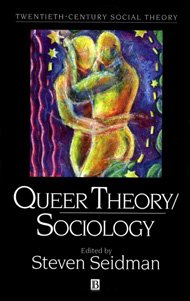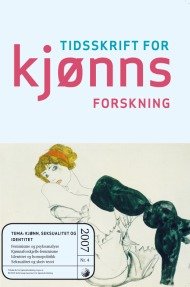| 
While the “classical queer theory” of the 1990s[8] focused on a conceptual and cultural critique of discursive regulations of sex, gender, and sexuality (and their role as prerequisites for subjectivity), which is indeed politically important, this scholarship did not deal directly with the social world, and therefore easily seemed to be of limited use in the day-to-day running of a social movement aiming to change the social circumstances of people and the institutions and structures of society. This, after all, constitutes the core of politics for many. Therefore, the sociological critique of the limitations of queer theory in analysis of the social, which began soon after the breakthrough of queer, has become intertwined with the critique of the limitations of queer theory’s political applicability. For example, Steven Seidman discussed the tensions between queer theory and sociological analysis in relation to the queer social movement at length in several publications. On the one hand, he certainly appreciated the way queer theory highlighted discursive regulations, which he considered both politically and socially highly significant: “It is this rendering of literary analysis into social analysis, of textual critique into social critique, of readings into a political practice, of politics into the politics of knowledge, that makes deconstruction and queer theory inspired by it an important movement of theory and politics”.[9] On the other hand, he considered the lack of attention to the social world to be a problem for the application of the perspective in a social movement: Yet, queer theorists have often surrendered to a narrow culturalism or textualism; they have not articulated their critique of knowledge with a critique of the social conditions productive of such textual figures; they have not provided an account of the social conditions of their own critique. The “social” is often narrowed into categories of knowledge and culture while the latter is itself often reduced to linguistic, discursive binary figures.[10] Adding the lack of articulation of queer theory’s ethics to his critique, he concluded, “If we are to recover a fuller social critical perspective and a transformative political vision, one fruitful direction is to articulate a politics with an institutional social analysis that does not disavow a willingness to spell out its own ethical standpoint”.[11] In addition, the preoccupation of most queer-theoretical scholarship with cultural production in arts and media has inspired activism that often relies on play with cultural signs and this, in turn, has prompted criticism of queer activism being overly preoccupied with aesthetics (as opposed to “real” social issues). It has been suggested that there is more style than political content to the politics of inaccurate repetition of standard gender performatives that is inspired by Butler.[12] This critique is related to the general concern with the “cultural turn”[13] of leftist politics, and politics becoming “merely cultural”.[14] In general, the criticism has implied deficient understanding of the needs of people and the dynamics of political advocacy. |  | 
![[8] At present, when we](Resources/item1a3a1b1a1a1.gif)

![[9] Steven Seidman, “Deconstructing queer](Resources/item1a3a1b1a1a.gif)
| 
|  |  | 
The critique of innate identity and identity politics has constituted one of the most demanding hurdles for the application of queer theory in activism, particularly as queer activism springs from a movement that has historically been founded on gay identity and belonging. It has been a challenge to conceptualise (queer) activism as anything else than work on behalf of one or a few more or less clearly defined groups. In her book Vad är queer? [What is queer?] Fanny Ambjörnsson even asks if queer does not make more concrete politics impossible altogether. She reports that Swedish queer activists have resorted to “strategic essentialism” in order to be able to formulate feasible political agendas.[15] From a queer-theoretical perspective this position involves a paradox since, in such politics, the central critique remains closeted as internal knowledge of the activist group. It has indeed been demanding to realise notions of identity deconstruction in external communication. For example, Liv Mertz recounts problems in a Danish queer group’s promotion of initiatives informed by the queer-theoretical critical view on identity categories to authorities and a general public unfamiliar with the postmodern philosophy, causing the messages to be completely misinterpreted.[16] However, according to her, “politics of contingent foundations” (as suggested by Butler) can successfully be realised, without directly engaging the public or politicians, by making proposals that discreetly create new discursive openings even if their anti-identitarian implications may not be grasped by mainstream society.[17] Meanwhile, the application of queer-theoretical ideas may have paradoxical outcomes also within the movement. The construction of queer politics as a coalition through increased acknowledgement of the diversity among homosexuals and a reforming of alliances between gay men and lesbians as well as with bisexuals and transgendered people is generally seen as the most concrete effect of the queer-theoretical view of identity as fluid. Nevertheless, the numerous subgroups within the coalition have, according to Ambjörnsson, also become sites of construction of ever more narrowly defined and specialized identities.[18] That way, it is feared, the “new” queer movement might remain almost as identity-driven as the “old” gay and lesbian movement. |  | ![[15] Fanny Ambjörnsson, Vad är](Resources/item1a3a1b1a1b.gif)
| 
|  |  | 
Norwegian sociologist Agnes Bolsø has presented a proposal for sexual politics that aims to “turn queer into practical organisation politics”.[19] Her plan focuses on a departure from gay and lesbian identity politics without emphasising radicalism as a raison d’être and thus constitutes a good example of an idea for queer politics and activism that is entirely based on the theoretical aspect of queer.[20] In an article called “Identitet og homopolitikk etter queer” [Identity and gay politics after queer], in Tidsskrift for kjønnsforskning, Bolsø sketches out the ingredients of a sexual politics that would gradually distance itself from the homo/hetero binary and the identity categories that at present define the dominant gay and lesbian politics in Norway. She starts off from observations that she has made in her own research on sexual encounters and relations between men and women. It turns out that these are not always as unambiguously heterosexual as one might expect. It happens relatively often that the sexual practices clearly break the congruence of sex, gender, and sexuality expected in the heterosexual matrix, for example, when those involved want to emphasise the femininity of the man or the masculinity of the woman either as a self-identification or as something desirable in the partner in the sexual interaction, or both. Such twists in sexual interactions could superficially be regarded simply as heterosexual because they occur between a man and a woman. Yet, for Bolsø, a focus on these impulses may inspire substantial revisions of sexual politics. In the end, her proposal is elegantly simple: gays and lesbians should no longer be included as groups in public educational and information efforts concerning sexuality. Instead these efforts should on all levels – from counselling of individuals to the research that informs public policies – be formulated in such a way that homosexuality and non-heterosexuality are taken into account as potential elements in any sexual encounter or practice rather than as issues that concern a given minority. Bolsø does admit that creating political engagement and commitment to such an agenda may be a challenge. It is not likely that the people who, for the purposes of her study, accepted to discuss practices that they considered very private would overnight become actors in a new movement in sexual politics. Therefore, it is necessary that organisations associated with the traditional gay and lesbian movement and their activists, in the first stage, take responsibility for the struggle for new queer policies. For this purpose, she calls for a reformed gay movement.[21] |  | 
![[19] Agnes Bolsø, “Identitet og](Resources/item1a3a1b1aa.gif)
| 
|  |  | 
|  |  |
|